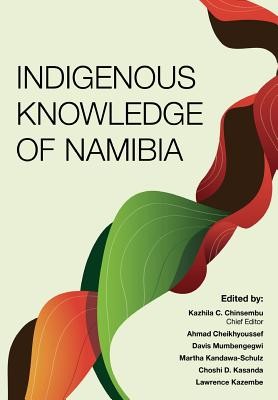
- We will send in 10–14 business days.
- Publisher: Univ. of Namibia Press
- Year: 2015
- Pages: 416
- ISBN-10: 9991642056
- ISBN-13: 9789991642055
- Format: 17 x 24.4 x 2.2 cm, minkšti viršeliai
- Language: English
- SAVE -10% with code: EXTRA
Indigenous Knowledge of Namibia (e-book) (used book) | bookbook.eu
Reviews
Description
Indigenous knowledge is the dynamic information base of a society, facilitating communication and decision-making. It is the cornerstone of many modern-day innovations in science and technology. It is also a ready and valuable resource for sustainable and resilient livelihoods, and attracts increasing public interest due to its applications in bio-technology, health, bioprospecting, pharmaceuticals, agriculture, food preparation, mathematics and astronomy. INDIGENOUS KNOWLEDGE OF NAMIBIA is a fascinating compendium aimed at a wide readership of academics and students, government officials, policy makers, and development partners. The 17 chapters examine the indigenous knowledge of medicinal plants for treating HIV/AIDS, malaria, cancer, and other microbial infections of humans and livestock; indigenous foods; coping and response strategies in dealing with human-wildlife conflicts, floods, gender, climate change and the management of natural resources. A new rationalisation of adolescent customary and initiation ceremonies is recommended in response to the HIV/AIDS pandemic; and a case study of the San people of Namibia speaks to the challenges of harmonising modern education with that of indigenous people.
EXTRA 10 % discount with code: EXTRA
The promotion ends in 22d.14:48:26
The discount code is valid when purchasing from 10 €. Discounts do not stack.
- Publisher: Univ. of Namibia Press
- Year: 2015
- Pages: 416
- ISBN-10: 9991642056
- ISBN-13: 9789991642055
- Format: 17 x 24.4 x 2.2 cm, minkšti viršeliai
- Language: English English
Indigenous knowledge is the dynamic information base of a society, facilitating communication and decision-making. It is the cornerstone of many modern-day innovations in science and technology. It is also a ready and valuable resource for sustainable and resilient livelihoods, and attracts increasing public interest due to its applications in bio-technology, health, bioprospecting, pharmaceuticals, agriculture, food preparation, mathematics and astronomy. INDIGENOUS KNOWLEDGE OF NAMIBIA is a fascinating compendium aimed at a wide readership of academics and students, government officials, policy makers, and development partners. The 17 chapters examine the indigenous knowledge of medicinal plants for treating HIV/AIDS, malaria, cancer, and other microbial infections of humans and livestock; indigenous foods; coping and response strategies in dealing with human-wildlife conflicts, floods, gender, climate change and the management of natural resources. A new rationalisation of adolescent customary and initiation ceremonies is recommended in response to the HIV/AIDS pandemic; and a case study of the San people of Namibia speaks to the challenges of harmonising modern education with that of indigenous people.


Reviews